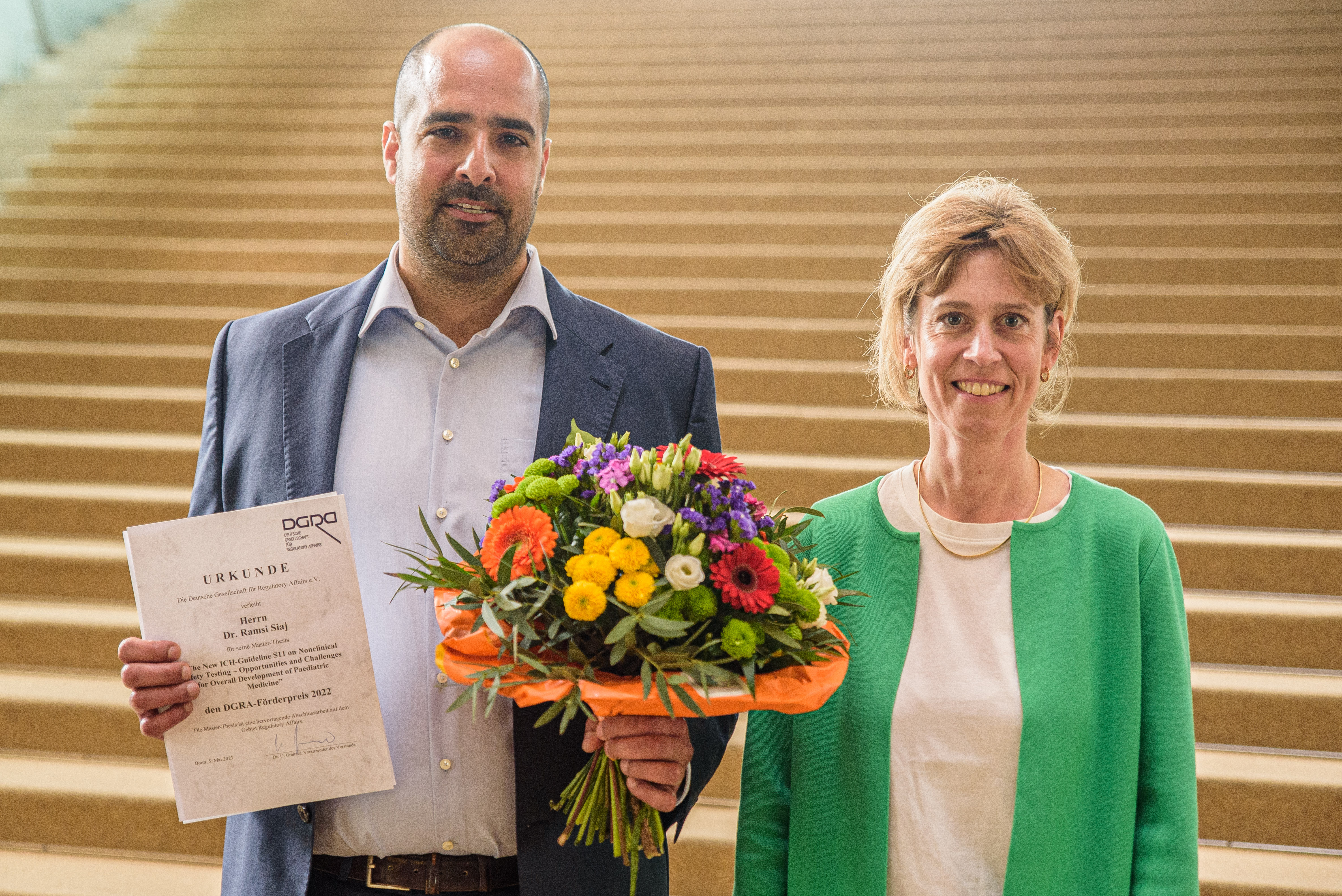Förderung wissenschaftlicher Arbeit
DGRA-Förderpreis
Preisverleihung 2023

Die Deutsche Gesellschaft für Regulatory Affairs hat auf ihrem 25. Jahreskongress in Bonn Herrn Dr. Ramsi Siaj am 5. Mai 2023 im Plenarsaal des World Conference Center den Förderpreis für seine Masterarbeit “The New ICH-Guideline S11 on Nonclinical Safety Testing – Opportunities and Challenges for Overall Development of Paediatric Medicine” verliehen.
Die Deutsche Gesellschaft für Regulatory Affairs e.V. hatte den Förderpreis 2022 für eine hervorragende, aktuell verfasste, wissenschaftliche Arbeit im Bereich Drug Regulatory Affairs ausgeschrieben.
Die Urkunde übergab die stellvertretende Vorsitzende des DGRA e.V. Frau Dr. Alexandra Eckhoff und las dabei aus der Laudatio von Frau Dr. Anna Silke Hammerbacher, die im Folgenden nachgelesen werden kann.
Laudatio von Frau Dr. Anna Silke Hammerbacher für Herrn Dr. Ramsi Siaj im Rahmen der Verleihung des DGRA-Förderpreises 2022.
Titel der Masterarbeit:
The New ICH-Guideline S11 on Nonclinical Safety Testing – Opportunities and Challenges for Overall Development of Paediatric Medicine
Dear Dr. Siaj, dear audience,
I have the great pleasure today to award the “DGRA Förderpreis” to Dr Ramsi Siaj for his Master Thesis “The New ICH-Guideline S11 on Nonclinical Safety Testing - Opportunities and Challenges for Overall Development of Paediatric Medicine”.
The aim of the ICH S11 is to set "international standards for, and promote harmonisation of, the nonclinical safety assessments to support the development of pharmaceuticals intended for paediatric use" (ICH S11).
In his Thesis, Dr. Siaj aimed and succeded at a critical review of the ICH S11 guidance on nonclinical safety testing and their consequences for the overall development of paediatric medicines, and then taking it a step further to look at its applicability for general drug development.
For this purpose, the scope of the guidance, the new decision-making tool for determining the need of additional nonclinical safety studies, the Weight of Evidence review, which is introduced with this guidance, were thoroughly assessed. Furthermore, alternatives to juvenile animal studies and their value and timing, the approach of dose range finding studies and the consequences, as well as recommendations to the paediatric-first/only development were reviewed and discussed by Dr. Siaj.
This thesis combines a detailed review of the guidance, and goes a step further by assessing its applicability to general pharmaceutical development outside of paediatric studies. Furthermore, the author provides a detailed assessment of the new tool for decision making and lays out a proposal for its broader use to reduce animal testing in general drug development, not only in the development of paediatric medicines.
Therefore, this thesis is of interest for a broad audience working within drug development, not only for the regulatory community, and hence was recommended and selected for the DGRA Förderpreis! Congratulations to Dr. Siaj!


